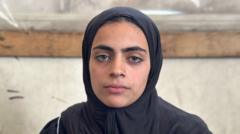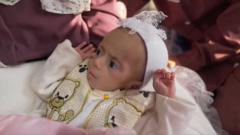The ongoing conflict in Gaza has led to alarming consequences for pregnant women and newborns, marked by malnutrition, increased risks of complications, and difficulties in accessing essential healthcare resources.
The Harrowing Reality of Pregnancy and Childbirth in Gaza Amidst Conflict

The Harrowing Reality of Pregnancy and Childbirth in Gaza Amidst Conflict
Severe conditions under the Israeli blockade have worsened pregnancy and childbirth in Gaza, compromising the health of mothers and newborns.
As conflict rages on in Gaza, the plight of pregnant women and newborns has become increasingly grim. Amidst the realities of war, new life emerges, yet the dire circumstances severely impact the health of mothers and their babies. The United Nations has reported that acute food shortages have resulted in one in ten newborns being underweight or born prematurely. Furthermore, there has been a troubling rise in miscarriages, stillbirths, and congenital defects.
At Nasser hospital in Khan Younis, Malak Brees, currently seven months pregnant, lives under constant fear of losing her baby due to the rampant bombings and evacuation orders. “I’m terrified of having a premature birth,” she explains, sharing how doctors attribute her amniotic fluid loss to malnutrition and exhaustion.
The blockade imposed by Israel, described as a means to pressure Hamas, restricts essential medical resources and has severely impacted childbirth. Women are often forced to give birth without adequate medical assistance, as basic necessities like painkillers and hygiene products go scarce. According to nurse Sandra Killen, women who give birth vaginally are typically discharged after just a few hours, leaving them vulnerable in unfamiliar environments.
Nasser hospital's neonatal intensive care unit, already overwhelmed due to a nearby hospital being bombed, struggles to accommodate an influx of patients. Currently, basic prenatal care is unattainable for most of the estimated 55,000 pregnant women in Gaza, leading to deteriorating mental health among these women, as noted by Dr. Ahmad al-Farra.
Aya al-Skafi’s tragic story underscores the dire situation. Her four-month-old daughter, Jenan, succumbed to malnutrition as Aya struggled to provide sufficient nutrition for herself amid scarce resources. “I begged for help but only God answered,” she recounts, the emotional toll of her daughter's suffering etched in her memory.
Additionally, organizations like the Gaza Infant Nutrition Alliance are stepping up with local medic training programs to better support mothers facing these challenges. Killen emphasizes that breastfeeding is usually preferable, albeit complicated by current conditions. The emotional labor of these mothers is magnified by their experiences of trauma, decreased access to familial support, and the overarching climate of fear and uncertainty.
Stories of mothers facing unimaginable hardships linger, such as a woman whose efforts to safely deliver her baby in a tent were thwarted by airstrikes, resulting in tragedy. Another mother escaped aerial bombardment but experienced severe injuries affecting her ability to feed her child. The human cost of this ongoing conflict is starkly evident.
Yet, amidst the chaos, hope remains. Community bonds and support networks are crucial, even as the specter of loss looms large. However, the continuing conflict casts a long, dark shadow over what should be moments of joy, transforming the act of childbirth into an experience fraught with anxiety and desperation in an environment where the fight for survival becomes paramount.





















